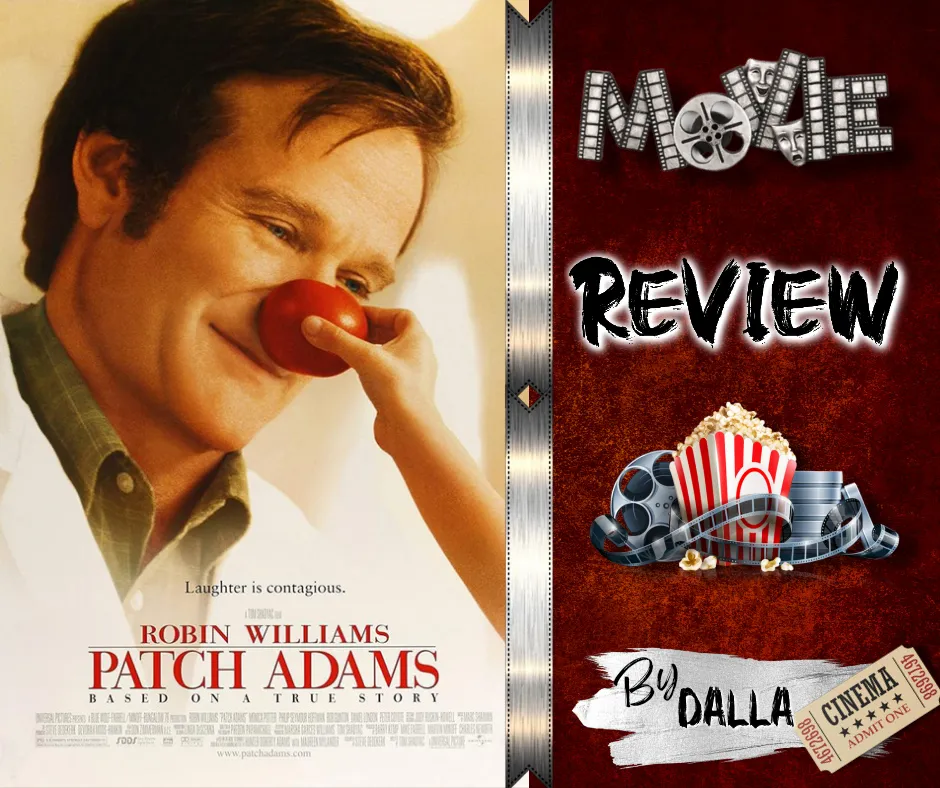

Greetings friends of @moviesonhive! today I bring you this review that came as a result of another post I did a few days ago about Laughter Therapy as a strategy to deal with one of the most common diseases in the world, which is Anxiety.
Writing that post I could not help remembering this movie because it is based on the life of the creator of this therapy that today is so useful as an adjuvant in the treatment of many psychological and physical diseases worldwide, however, I did not remember the movie well and if there is something I hate! is trying to remember something and not being able to.
So I said no way I'm going to talk about this and not remember the biography of the creator of the therapy! In the end I couldn't watch the movie and I just made the post with what I remembered of it and I said to myself: "on Monday I'll watch it because I need to do this mental exercise" and that's how I ended up watching it for the second time this past Monday.
I can't tell you how strange it felt to watch this movie after so long, I remember watching it close to when it was released, so it must have been either in 1998 or the following year, that is 1 or 2 years before I graduated as a doctor and now I understand why it is so different for me to watch it now and feel as if I had never seen it, I will tell you why later in my analysis....
¡Saludos amigos de @moviesonhive! el día de hoy les traigo esta review que surgió como consecuencia de otro post que hice hace unos días sobre la Risoterapia como una estrategia para afrontar una de las enfermedades más comunes en el mundo, que es la Ansiedad.
Escribiendo ese post no pude evitar acordarme de esta película porque está basada en la vida del que es el creador de esta terapia que hoy en día es tan útil como coadyuvante en el tratamiento de muchísimas enfermedades tanto psicológicas como físicas a nivel mundial, sin embargo, no recordaba bien la película y si hay algo que yo ¡odio! es intentar recordar algo y no poder.
Así que dije ¡no puede ser que vaya a hablar de esto y no recuerde la biografía del creador de la terapia! Al final no pude ver la película y solo hice el post con lo que recordaba de ella y me dije: "el lunes la veo porque necesito hacer este ejercicio mental" y así fue como terminé viéndola por segunda vez este lunes pasado.
Yo no les puedo explicar lo extraño que se sintió ver esta película después de tanto tiempo, recuerdo haberla visto cerca a cuando fue estrenada, así que debe haber sido o en 1998 o el año siguiente, es decir 1 o 2 años antes de graduarme de médico y ahora entiendo por qué me es tan distinto visualizarla ahora y sentir como si nunca la hubiera visto, les contaré porqué más adelante en mi análisis…

This movie is the biography of this man named Patch Adams, who in a state of crisis in his life does not get sense to continue living, so he falls into a deep Depression and decides of his own free will to commit himself in a Psychiatric Center after a suicide attempt.
Being in a psychiatric center surrounded by so many people with problems that he could not communicate with, he realizes that Laughter is the best way to communicate with them, he finally feels that he connects with other people and also helps them with their illnesses.
All this makes him feel that he finally found what he was looking for, a reason to live, which was to help others. So from there he decides to start studying medicine to continue reproducing what he achieved in that psychiatric center in other people.
Thus beginning the life of a medical student with a very different vision from the rest because of everything he had already gone through and how it is so difficult for him to be accepted with his way of thinking in a career as indoctrinating as Medicine, with which he will have to fight during all his years of study to achieve his goals.
Esta película es la biografía de este hombre llamado Patch Adams, quien en un estado de crisis en su vida no consigue sentido para seguir viviendo, así que cae en una profunda Depresión y decide por voluntad propia internarse en un Centro Psiquiátrico posterior a un intento de suicidio.
Estando en centro psiquiátrico rodeado de tantas personas con problemas con las que él no podía comunicarse, se da cuenta de que la Risa es la mejor forma de comunicación con ellos, por fin siente que conecta con otras personas y además los ayuda con sus enfermedades.
Todo eso le hace sentir que ¡por fin! encontró eso que tanto buscaba, una razón para vivir, que era ayudar a los demás. Así que a partir de ahí decide empezar a estudiar medicina para seguir reproduciendo lo que él logró en ese centro psiquiátrico en otras personas más.
Iniciando así la vida de un estudiante de medicina con una visión muy distinta a la del resto por todo lo que ya había pasado y como se le hace tan difícil que lo acepten con su manera de pensar en una carrera tan adoctrinadora como es la Medicina, con la que tendrá que luchar durante todos sus años de estudios para lograr sus objetivos.

What I am telling you above is a very simplified form of what the movie is about, and in fact if you look at the description they give of it it is basically that, the biography of a man who established that "laughter was the best cure for disease".
I should have seen it just as it is described and not analyzed the movie more in depth when I saw it so many years ago, because as I was watching it this time I was feeling more and more identified with this character and I don't remember having felt it before.
The explanation to this is that I was about to graduate friends and at that time for my priority was to follow the rules of all my superiors, just learn as much as I could from them and from science, however today I know that what they teach, not always, is the right thing or the right way.
Lo que les cuento arriba es una forma muy simplificada de lo que trata la película, y de hecho si ves en la descripción que dan de ella es básicamente eso, la biografía de un hombre que estableció que "la risa era la mejor cura para las enfermedades".
Debí haberla visto solo así como la describen por ahí y no haber analizado más a profundidad la película cuando la vi hace tantos años en definitiva, porque a medida que iba viéndola esta vez me iba sintiendo más y más identificada con este personaje y no recuerdo haberlo sentido antes.
La explicación a esto es que estaba a punto de graduarme amigos y en ese tiempo para mi prioridad era seguir las reglas de todos mis superiores, solo aprender lo que más pudiera de ellos y de la ciencia, sin embargo hoy en día sé que lo que ellos enseñan, no siempre, es lo correcto ni de la forma correcta.

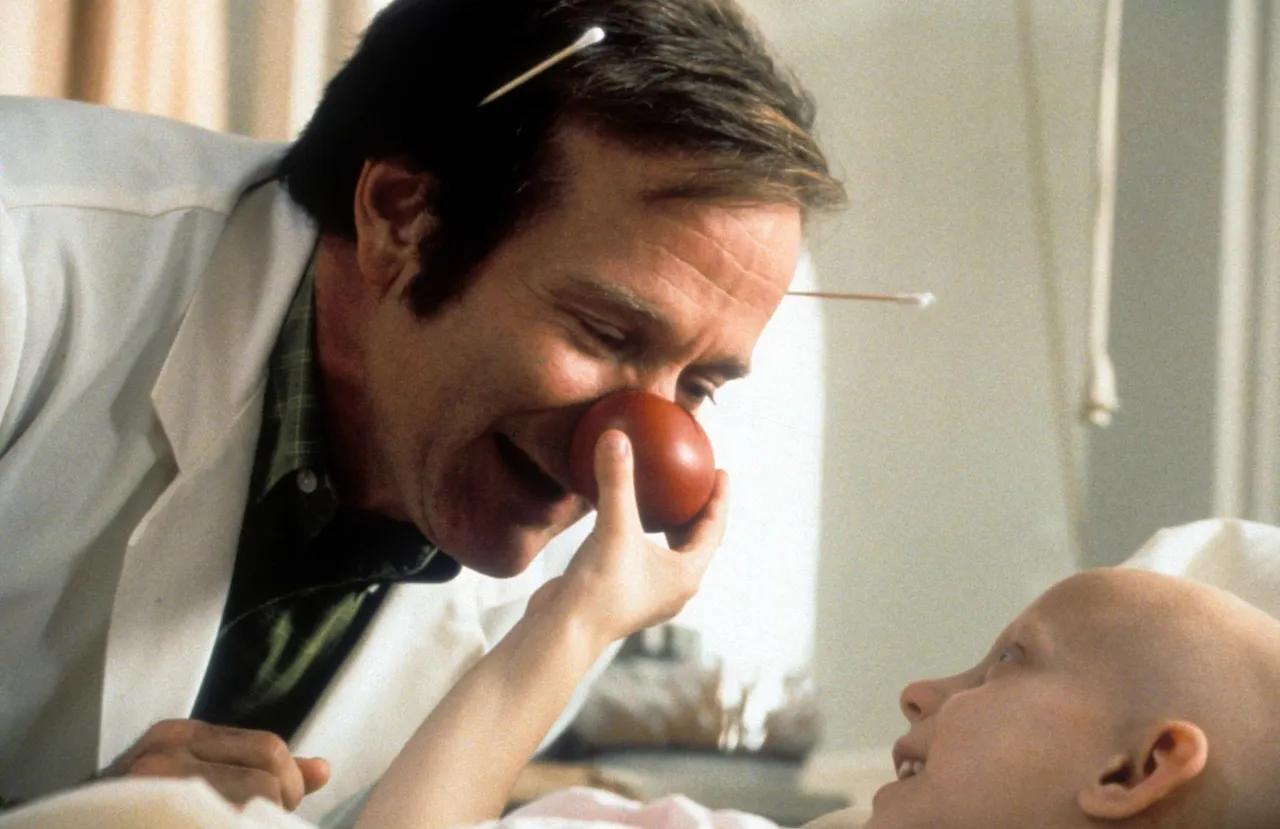

I don't know if you are aware of it, but the medical career is a complicated career more because of the pressure we must endure than because of the knowledge itself; it is really something more "survival" style, something like: "if you are able to endure this fatigue and all this academic pressure, you will be able to climb to the next step and become a doctor some day".
And that survival race is not even complicated by the patients or the diseases, it's complicated by the teachers! This movie reminded me of all that, and the training method for doctors is exactly the same as the one Patch was fighting against, it is a compendium of demands from the moment you start your career until you finish where what prevails is to respect almost militarized rules that "according to" have been proven to be the best strategy to train doctors.
The regulations are too strict, with overly strict limits in terms of the student-teacher and doctor-patient relationship. In the career there is not much time to teach about humanity, that is "supposed" to come out of you during those 7 years that the career lasts (in the university where I graduated) the training is mainly academic and of course based on practice in hospitals, but there is nothing else, we see very few social classes.
When I graduated I thought that this training was fine, that what I had been taught was the duty to be, that there was nothing beyond my horizons and that is why I could not understand this movie well at that time when I saw it for the first time. And the thing is that Patch Adams always had the correct vision of what medicine should be, while I was trying to subsist to my own indoctrinating vision which is exactly what we are shown in the movie and which was instilled by most of my teachers.
At the time I only saw Patch as someone who wanted to go against the rules and who, while he made a clear point that making someone happy is important to their recovery, to me at the time left no further message in the movie -big mistake!
No sé si ustedes están al tanto, pero la carrera de medicina es una carrera complicada más por la presión que debemos soportar, que, por los propios conocimientos; realmente es algo más estilo "supervivencia" algo así como: "si eres capaz de soportar este cansancio y toda esta presión académica podrás escalar al siguiente escalón y ser alguna vez médico".
Y esa carrera de supervivencia ni siquiera la complican tanto los pacientes, ni las enfermedades, la complican son ¡los docentes! Esta película me hizo recordar todo eso, y es que el método de formación de los médicos es exactamente el mismo contra el que luchaba Patch, es un compendio de exigencias desde que empiezas la carrera hasta que terminas donde lo que prevalece es respetar normas casi militarizadas que "según" se han comprobado que es la mejor de las estrategias para formar a los médicos.
Son reglamentos demasiado estrictos, con límites demasiados marcados en lo que se refiere a la relación estudiante-profesor y médico-paciente. En la carrera no hay mucho tiempo de enseñar sobre humanidad, eso "se supone" debe surgir de ti durante esos 7 años que dura la carrera (en la universidad donde yo me gradué) la formación es principalmente académica y por supuesto basada en la práctica en los hospitales, pero no hay nada más, vemos muy pocas clases sociales.
Cuando yo me gradué creí que esa formación estaba bien, que lo que me habían enseñado era el deber ser, que no había nada más allá de mis horizontes y por eso no pude entender bien esta película en ese tiempo en que la vi por primera vez. Y es que Patch Adams siempre tuvo la visión correcta de lo que debe ser la medicina, mientras yo estaba tratando de subsistir a mi propia visión adoctrinadora que es exactamente la que nos muestran en la película y que era inculcada por la mayoría de mis docentes.
En ese momento yo solo veía a Patch como alguien que quería ir contra las reglas y que, si bien dejó un punto claro que es que el hacer feliz a alguien es importante para su recuperación, para mí en ese momento no dejaba más ningún mensaje la película ¡Grave error!

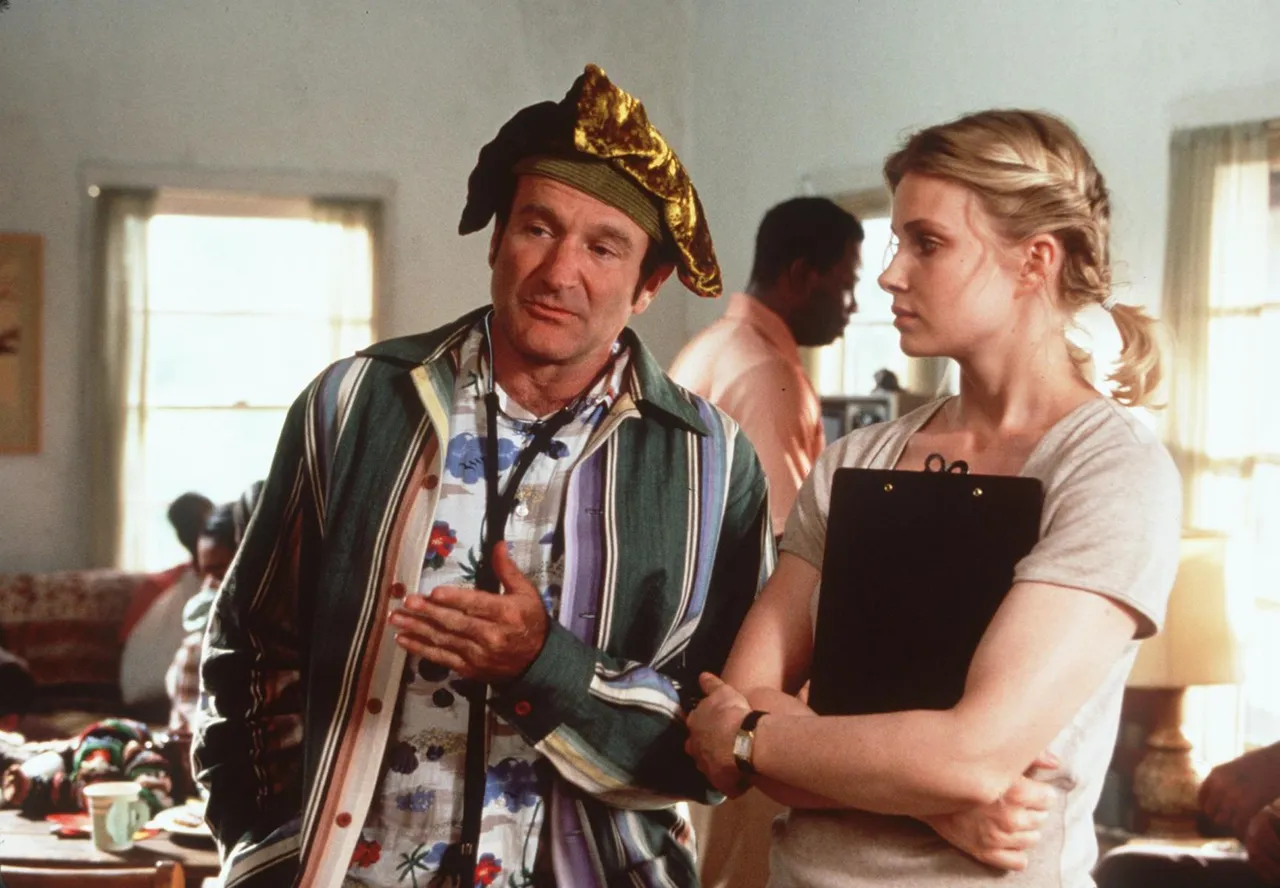

Today, after more than 12 years as a medical graduate, I can attest that experience is extremely important in a physician, because when you are just starting to practice you definitely do not understand many things, you have many insecurities, you have a too scientific approach because you have just come out of university and indoctrination.
But as you gain experience, not only professionally but in life, you realize that health is not just about being biologically well, that the work as physicians is not just about prolonging the arrival of death in a sick person, it is much more than that, just as Patch thought and tried to make others see.
Practicing medicine should be based fundamentally on providing Quality of Life to the patient, it is about trying to calm their fears, to empathize enough with them to make them feel understood and to be able to achieve the objectives while the pharmacological treatment takes effect. Today I ratify that medicine should be based on humanity, more than on science, exactly the same vision that Patch emphasized throughout the film and for which he fought so hard.
All the training that Patch receives, and about which he is against, is everything that I am currently critical of the academic and practical training of the medical career, because they do not teach you to learn even the name of the patients, they do not teach you to sit down for a moment to try to understand what is going on in their mind, for you that person should be just a patient and nothing more, someone very external to you.
According to their criteria it is to protect us, to prevent us from getting involved with them so as not to cause us harm, but for a long time now I have been asking myself: to what extent is that all right for the patient? They are taking care of us psychologically as students and future doctors, but what about the patient?
Hoy en día después de más de 12 años de graduada de médico puedo dar fe de que la experiencia es sumamente importante en un médico, porque cuando apenas estás empezando a ejercer definitivamente tú no comprendes muchas cosas, tienes muchas inseguridades, tienes un enfoque demasiado científico porque acabas de salir de la universidad y del adoctrinamiento.
Pero en la medida en que vas ganando experiencia, no solo en lo profesional sino en la vida, te das cuenta de que la salud no es solamente estar bien biológicamente, que el trabajo como médicos no es solo prolongar la llegada de la muerte en un enfermo, es muchísimo más que eso, tal cual como lo pensaba Patch e intentaba que los demás vieran.
Practicar medicina debe basarse fundamentalmente en proporcionar Calidad de Vida al enfermo, es tratar de calmar sus temores, de empatizar lo suficientemente con ellos para que se sientan comprendidos y poder lograr los objetivos mientras el tratamiento farmacológico hace su efecto. Hoy en día ratifico que la medicina debe basarse en humanidad, más que en ciencia, exactamente la misma visión que recalcaba Patch en toda la película y por la cual tanto luchó.
Toda la formación que recibe Patch, y sobre la que está en contra, es todo lo que en la actualidad yo crítico de la formación académica y práctica de la carrera de medicina, porque es que no te enseñan a aprenderte ni siquiera el nombre de los pacientes, no te enseñan a sentarte un momento a tratar de comprender lo que pasa por su mente, para ti esa persona debe ser solo un paciente y nada más, alguien muy externo a ti.
Según sus criterios es para protegernos, para evitar que nos involucremos con ellos para no causarnos daño, pero desde hace mucho tiempo me pregunto: ¿Hasta qué punto eso está del todo bien eso para el paciente? Están cuidándonos psicológicamente a nosotros como estudiantes y futuros médicos, pero ¿y al paciente?

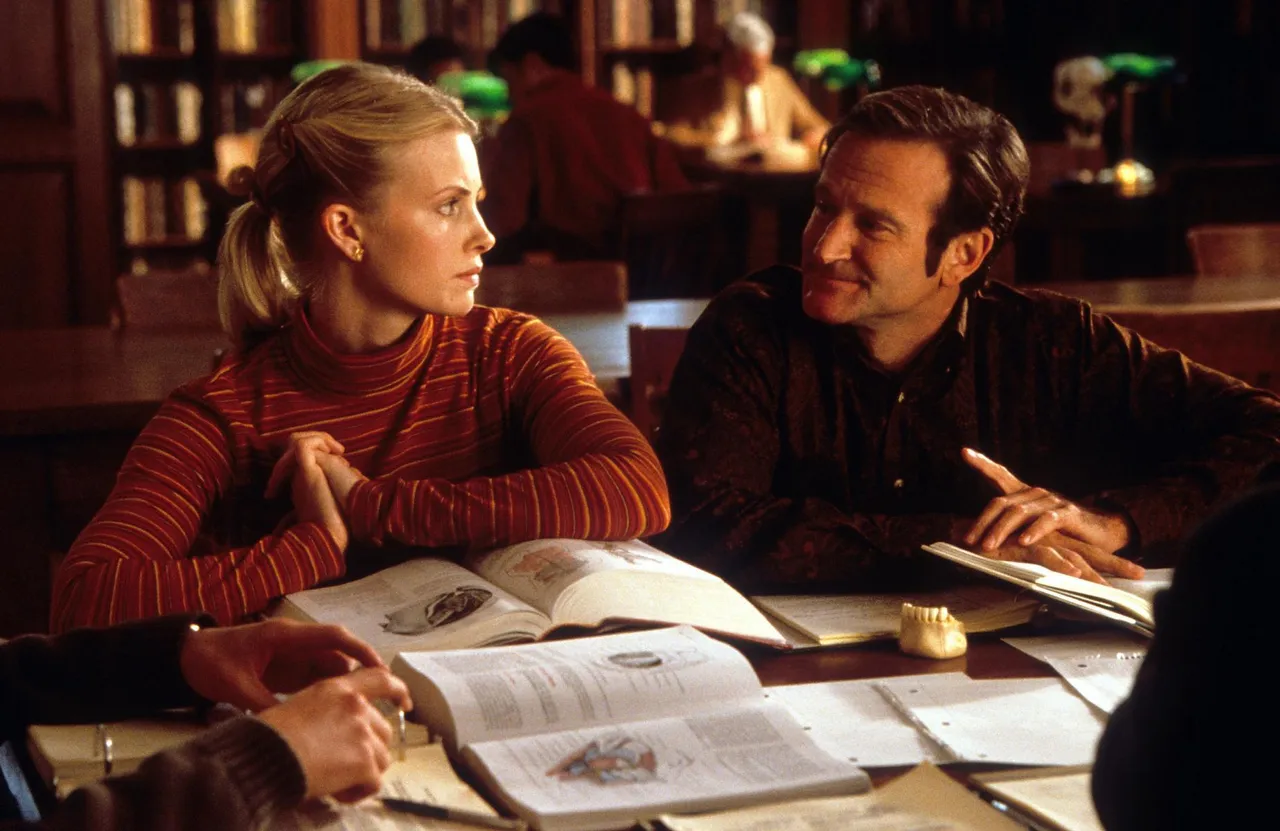

The medical rounds are just as they are presented in the movie, they only teach us to go through each stretcher and say a lot of medical terms that the patient does not understand and we know it, in fact, we learn that language so that they do not understand us on purpose, because we know that hearing certain things can affect them more emotionally, although many times words like "amputation" slip out and we do not realize it because we are so automated and we believe that we speak a language that only we understand.
The automation we learn does not allow us to realize the mistakes we make when speaking in front of that stretcher, because we do not even look the patient in the face while we make the rounds, we only focus on delivering the stories to the group that will continue the shift, because fatigue consumes us, there are too many patients and we can not lose any second of time.
The learning they give us is so marked! that I currently do not remember almost any of my patients' names and sometimes it is difficult for me to remember even their faces, which gives me a horrible shame! every time I see them and I do not remember their names or they greet me and I do not know who it is, but it is something that escapes my control and remains stored in my subconscious because I have to protect myself.
That is a product of that protection mechanism that we are prepared to have whether you want it or not. If you do not remember a person's name, it is difficult to establish a link with him/her beyond work, the idea is that it does not affect us too much if they get complicated or die, that is the reality! to protect our psyche, which is fine for us, but I repeat: is it also fine for the patient?
Las rondas médicas son tal cual ahí las presentan en la película, solo nos enseñan a pasar por cada camilla y decir un montón de términos médicos que el paciente no entiende y nosotros lo sabemos, de hecho, aprendemos ese lenguaje para que no nos entiendan a adrede, porque sabemos que el escuchar ciertas cosas puede afectarlos emocionalmente más a ellos, aunque muchas veces se escapan palabras como "amputación" y no nos damos cuenta por lo automatizados que estamos y que creemos que hablamos un lenguaje que solo nosotros entendemos.
La automatización que aprendemos no nos deja darnos cuenta de los errores que cometemos a la hora de hablar frente a esa camilla, porque ni siquiera miramos al paciente a la cara mientras hacemos las rondas, solo nos enfocamos en entregar las historias al grupo que va a continuar el turno, porque el cansancio nos consume, son demasiados pacientes y no podemos perder ningún segundo de tiempo.
El aprendizaje que nos dan queda ¡tan marcado! que yo en la actualidad no recuerdo casi ningún nombre de mis pacientes y a veces se me dificulta recordar hasta las caras, cosa que me da una ¡vergüenza horrible! cada vez que los veo y no recuerdo sus nombres o me saludan y no sé quién es, pero es algo que escapa de mi control queda guardado en el subconsciente porque debo protegerme.
Eso es producto de ese mecanismo de protección que nos preparan para tener quieras o no. Si no recuerdas el nombre de una persona, difícilmente establezcas un vínculo con él más allá del laboral, la idea es que no nos afecte en demasía si se complican o fallecen ¡esa es la realidad! proteger nuestra psique, lo cual está bien para nosotros, pero repito: ¿está bien también para el paciente?

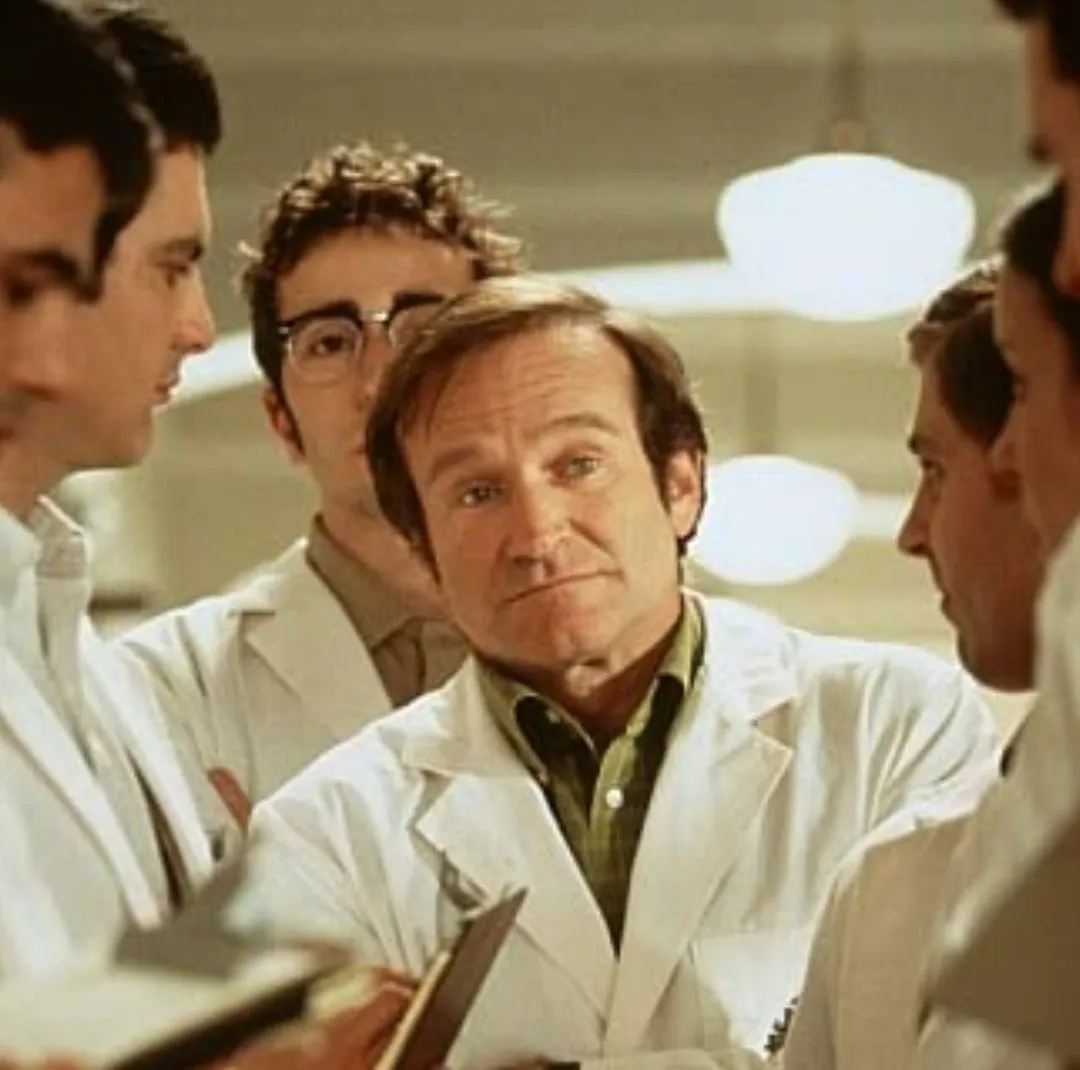

What person feels good when a doctor can't remember his or her name? You can ask me anything about a patient and I will remember it, even their weight, height and age, even though I am very bad at remembering numbers, but when it comes to patients, no! I remember almost everything about them but not their faces or names, isn't it ironic? because just as they show in the movie from day zero when we enter the faculty the first thing we learn is that we will have the responsibility of other people's lives on us and we can not waste a second of time or information, all this is done in a very traumatic way just as they show it in the movie at the beginning.
I remember in my internships some shifts where I had some time and I would talk to patients, but I mean really talk! of those patients if I did not forget their names or their faces, but, of course, there were better conditions than nowadays, I was sure that I was doing the most I could for him and I was sure that he was going to recover because we had the treatment, but nowadays that does not happen in this country sadly.
In Venezuela the situation is horrible because too many patients die every week and it would be too painful for us to make affective relationships with people we don't know if they will survive, besides the work is excessive and that! is exactly what makes the situation worse making many doctors seem not very human (others have other reasons of course) but I am talking specifically about this group in formation, they protect themselves psychologically.
Patch Adams was definitely surrounded by other conditions in the hospitals where he studied, but, on top of that he had really great - great! emotional fortitude. He even said that "we shouldn't be afraid of death, that we could laugh before it"
Even I was surprised to hear that, because we are all human. How many around here are capable of telling a joke to a person who is dying? Aren't there few? And no, my friends! We do not like to see anyone die and it is difficult for us to laugh at those moments, no matter how much we want the patient to have a good memory, in fact, many of us end up crying alone in the rest rooms when we see everything we did and we still did not manage to save someone.
Even to be in the foundation created by him where he prepares volunteers to travel around the world to give smiles, especially to children in need, requires too much psychological strength, that strength that they tried to create in the race and why "supposedly" they were so hard on us, but that, far from giving it to you, if you are like me, you must have realized, many years later, that it was not entirely necessary and ended up being too traumatic.
¿Qué persona se siente bien cuando un médico no recuerda su nombre? A mí me pueden preguntar lo que sea sobre un paciente y lo recordaré, incluso su peso, talla y edad, aun cuando soy muy mala para recordar números, pero cuando se trata de pacientes ¡no! De ellos sí recuerdo casi todo pero no las caras ni los nombres ¿irónico no? porque al igual que muestran en la película desde el día cero que entramos a la facultad lo primero que aprendemos es que tendremos la responsabilidad de la vida de otras personas sobre nosotros y no podemos perder ni un segundo de tiempo ni de información, todo esto lo hacen de una forma bastante traumática así mismo como lo muestran en la película al principio.
Recuerdo en mis internados algunas guardias donde tenía algo de tiempo y me ponía hablar con pacientes, pero me refiero a ¡hablar de verdad! de esos pacientes si no olvidaba sus nombres ni sus caras, pero, por supuesto, había mejores condiciones que en la actualidad, yo estaba segura de que estaba haciendo lo más que podía por él y tenía la seguridad de que iba a recuperarse porque contábamos con el tratamiento, pero en la actualidad eso no pasa en este país tristemente.
En Venezuela la situación es horrible porque mueren demasiados pacientes por semana y sería demasiado doloroso para nosotros mismos hacer relaciones afectivas con personas que no sabemos si sobrevivirán, además el trabajo es excesivo y ¡eso! es exactamente lo que empeora el panorama haciendo que muchos médicos parezcan poco humanos (otros tienen otras razones claro está) pero hablo en específico de este grupo en formación, ellos se protegen psicológicamente.
Patch Adams definitivamente estaba rodeado de otras condiciones en los hospitales donde estudiaba, pero, además de eso tenía y tiene en la actualidad realmente una gran ¡gran! fortaleza emocional. Él incluso decía que "no debemos tenerle miedo a la muerte, que podíamos reír antes de ella".
Hasta a mí me sorprendió escuchar eso, porque todos somos humanos ¿Cuántos por aquí son capaces de contarle un chiste a una persona que está muriendo? ¿Verdad que son pocos? Y eso ¡no amigos! No nos lo enseñan en la carrera, a nosotros no nos gusta ver a nadie morir y se nos hace difícil reírnos en esos momentos por mucho que queramos que el paciente se lleve un buen recuerdo, de hecho, muchos terminamos llorando solos en los cuartos de descanso cuando vemos todo lo que hicimos e igual no logramos salvar a alguien.
Incluso para estar en la fundación creada por él donde prepara a voluntarios para viajar por el mundo a regalar sonrisas, sobre todo a niños necesitados en situaciones de guerra, se requiere de demasiada fortaleza psicológica. Esa fortaleza que intentaron crearnos en la carrera y el por qué "supuestamente" fueron tan duros con nosotros, pero que, lejos de dártela, si eres como yo, debes haberte dado cuenta, muchos años después, que no era del todo necesaria y que terminó siendo bastante traumática.

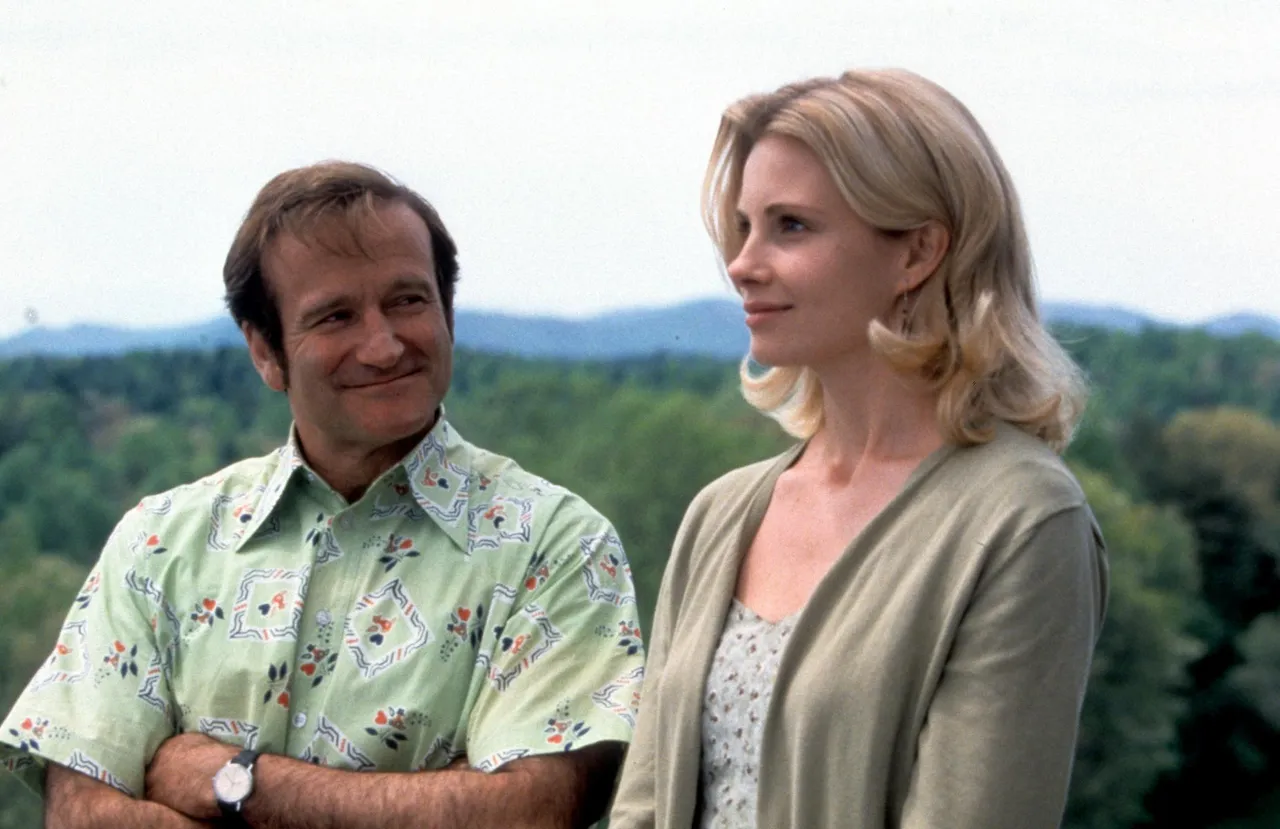

This film, besides showing us about the benefits of laughter on patients with "Laughter Therapy" and showing us the personality of Patch Adams, is fundamentally based on that, it is a form of criticism to the whole Educational System for medical training, which is excessively hierarchical, rigid and that does not admit changes for so many years, because until today it is still like that almost everywhere.
How difficult it is for the institutions that prepare doctors to admit a different vision on the form of education and on the need for us to understand that medicine is not only based on saving lives but also on giving quality of life to the patient and therefore making it more humanized.
On the other hand, he talks about the effect of Mental Illnesses on individuals and that, although many come to destroy your life, others come to build it and make you a better person. **Patch did not know what his life's goal was before he went to medical school, he felt lost, he tried to commit suicide because of that and when he entered the mental health center he found his life's goal.
That is why I sometimes think that mental illnesses are needed in the world and I try to make my patients see them, more than something negative, as a type of learning, because thanks to them we can make "the human being more human". Because those who get to be in the deepest part of one of them and manage to get out, believe me friends, I have corroborated it! they can understand others better, they have seen the worst of life and do not want anyone they appreciate to go through it, and many even learn to value life more and help others with the learning they obtained.
Esta película, además de mostrarnos sobre los beneficios de la risa sobre los pacientes con la "Risoterapia" y mostrarnos la personalidad de Patch Adams, se basa fundamentalmente en eso, es una forma de crítica a todo el Sistema Educativo para la formación médica, que es excesivamente jerarquizado, rígido y que no admite cambios desde hace tantos años, porque hasta la actualidad sigue siendo así en casi todos lados.
De lo difícil que es para las instituciones que preparan médicos admitir una visión diferente sobre la forma de educación y sobre la necesidad de que entendamos que la medicina no se basa solo en salvar vidas sino también darles calidad de vida al paciente y por ende hacerla más humanizada.
Por otro lado, nos habla del efecto de las Enfermedades Mentales en los individuos y de que, si bien, muchas llegan para destruir tu vida, otras llegan para construirla y hacerte una mejor persona. Patch no sabía cuál era el objetivo de su vida antes de entrar a estudiar medicina, se sentía perdido, intentó suicidarse por eso y al entrar al centro de salud mental encontró el objetivo de su vida.
Por eso a veces pienso que se necesitan las enfermedades mentales en el mundo y trato de que mis pacientes las vean, más que algo negativo, como un tipo de aprendizaje, porque gracias a ellas podemos hacer "más humano, al ser humano" Por muy absurdo que parezca lo que estoy diciendo, pero ¡es así! porque los que llegan a estar en lo más profundo de una de ellas y logran salir ¡créanme amigos, lo he corroborado! pueden entender mejor a otros, han visto lo peor de la vida y no quieren que nadie que aprecian pase por ahí, e incluso, muchos aprenden a valorar más la vida y ayudan a otros con el aprendizaje que obtuvieron.


Patchs Adams (Robin Williams)
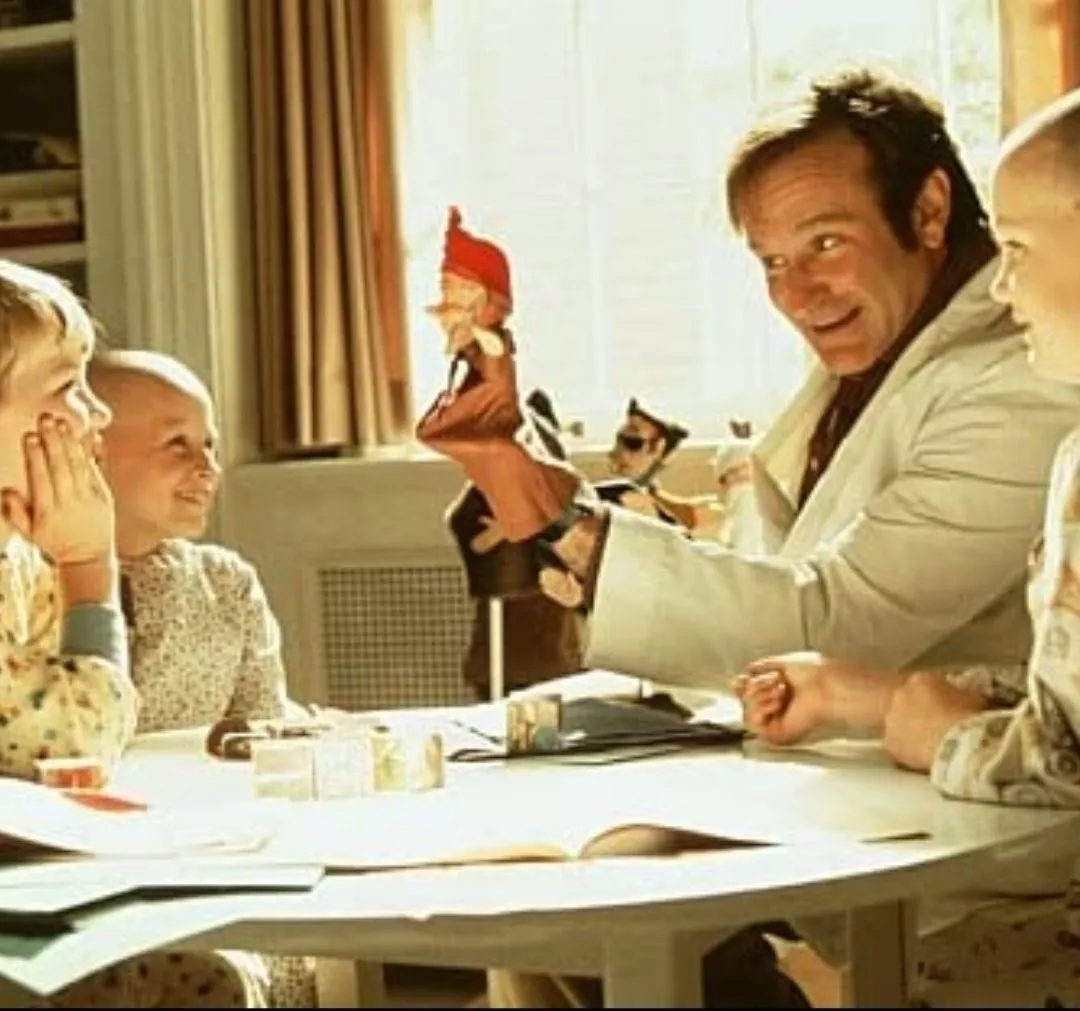

Patch is an irreverent, determined, intelligent, but above all very! sensitive and empathetic character. He has lived the worst of life because in reality he lost his father in the war when he was a child, was forced to emigrate with his mother and sister to the USA and suffered from bullying at school. Before he started studying medicine Patch had already lived through a lot for his age, too much for any psyche, so he collapsed, that's why he fell into a Depression.
That's why I say that it angers me a lot when they minimize or invalidate those emotional states of young people when people tell them comments like: "you have nothing to worry about, you just have to study" yes, of course! such a decisive stage in the life of any human being and you have nothing to worry about! adults, please be empathetic! Remember that you also went through that age and if you were very strong, didn't suffer from anything, nor were you ever stressed, remember that not everyone is like you.
Patch is a genius, and like most geniuses he is misunderstood, he sees the world in a very different way than others, he sees beyond the obvious and instead of focusing on the problem he seeks to focus on the solution. Something we should all do, but at that age not everyone can say they do and that is because Patch is different from most, he has a maturity and emotional intelligence that few others have.
He wants to make the world change with his vision, like most geniuses, but he came to the worst place to try to accomplish that, Medical School and its indoctrinators, but Patch is not going to give up in pursuit of his goals he wants to be a doctor! Not to get credit for it, but because he wants to help others, because that is his life goal!
Many remember the performances of Robin Williams especially for this movie, because he appeared to be happy and it was a lie, because he was really very depressed in real life; maybe it's because I already know, but I didn't see any happiness in those eyes, the performance was extraordinary, yes! but you could see his acting effort at all times when he laughed.
It is a performance to remember forever, but it is also a demonstration of how a depressed person can get used to and prefer to show a vision totally opposite to the one he is, that's why most of his movies were comedies, if you don't believe me read in google about "The Smiling Depression" and you will understand what I am talking about, anyway later I will touch those topics in my Psychohelp posts in my Blog.
Patch es un personaje irreverente, decidido, inteligente, pero sobre todo ¡muy! sensible y empático. Ha vivido lo peor de la vida porque en la realidad perdió a su padre en la guerra cuando era un niño, se vio obligado a emigrar junto a su madre y su hermana a EEUU y sufrió de bulling en el colegio. Antes de empezar a estudiar medicina ya Patch había vivido muchas cosas para su edad, demasiadas para cualquier psique, así que colapsó, por eso cayó en una Depresión.
Por eso digo que me enoja muchísimo cuando minimizan o invalidan esos estados emocionales de los jóvenes cuando la gente les dice comentarios como: "tú no tienes nada de qué preocuparte, solo debes estudiar" ¡sí, claro! una etapa tan decisiva en la vida de cualquier ser humano y ¡no tienes nada de qué preocuparte! ¡adultos sean empáticos por favor! Recuerden que ustedes también pasaron por esa edad y si fuiste muy fuerte, no sufriste de nada, ni te estresaste nunca, recuerda que no todos son como tú.
Patch es un genio, y como la mayoría de los genios es incomprendido, ve el mundo de una forma muy distinta a los demás, ve más allá de lo evidente y en vez de enfocarse en el problema busca enfocarse en la solución. Cosa que debemos hacer todos, pero a esa edad no todos pueden decir que lo hacen y es porque Patch es distinto a la mayoría tiene una madurez e inteligencia emocional que pocos tienen.
Quiere hacer el mundo cambiar con su visión, como la mayoría de los genios, pero llegó al peor lugar para intentar lograr eso, La Escuela de Medicina y sus adoctrinadores, pero Patch no se va a rendir en busca de sus objetivos ¡él quiere ser médico! No para que le reconozcan ese mérito, sino porque quiere ayudar a otros ¡porque ese es su objetivo de vida!
Muchos recuerdan las actuaciones de Robin Williams en especial por esta película, porque aparentaba estar feliz y era mentira, ya que estaba realmente muy deprimido en la vida real; tal vez es porque ya lo sé, pero yo no vi nada de felicidad en esos ojos, la actuación fue extraordinaria ¡eso sí! pero se le veía el esfuerzo actoral en todo momento cuando reía.
Es una actuación para recordar por siempre, pero es también una demostración de cómo una persona Deprimida puede acostumbrarse y preferir mostrar una visión totalmente opuesta a la que es, por eso la mayoría de sus películas era de comedia, sino me creen lean en google sobre "La Depresión Sonriente" y entenderán de lo que les hablo, de todas formas más adelante tocaré esos temas en mis post de Psicoayuda en mi Blog.

In addition to the ones I mentioned in the analysis, there are many, but I will highlight the ones I found most interesting:
Laughter is capable of curing diseases, it is something totally proven, the benefits of laughter are real, Patch himself says physiologically what it causes in the organism to his superior when he wants to get him out of the hospital, but he does not say it because it is the only reason why he acts like that, but because he knows that it is the only thing that the other person cares to hear and it is the only way to allow him to continue doing what he likes to see those people happy in the midst of so much suffering.
"Passion does not make doctors, I make doctors" This is a phrase taken verbatim from the movie of the same superior who hates Patch and his methods, this is a message for all careers not only for medicine, people like these abound in all professions, because I certify that passion can make a doctor and any professional, because the motivation to be good at something can be born from there!
"Patients do not need friends, but a doctor, when they are dying they will not look for the one who makes them laugh but the good one", this is also a phrase taken from the movie, it made me think that it is a complete absurdity! but it is what they really teach us, the movie did not lie, that is what they tell us in my career. This message is for you friends who are thinking of studying medicine, who are studying it or you who see those doctors who "look" not very serious or "very friendly", know that one thing does not have to be exclusive with the other, we can be good professionals and at the same time be friends of the patient and laugh a lot, I assure you that when the patient is dying he will look more to that doctor who looked friendly, than to that one who looked serious but knew a lot.
"Do no harm", foundation of the Hippocratic oath, people do not really know what the oath we doctors swear, I invite you to read it, many people name it and do not know what it really says, this is the fundamental principle of medicine, when you do not know something, it is better to do nothing than to do something wrong that complicates the patient.
Don't believe everything you see, the one you see above who looks, perhaps, "half crazy" may have a lot more knowledge than the others who are in suits, don't judge people by their external appearance, trust me! This is very common in medicine, the doctor who looks more outwardly humble is better than the one who looks like a God.
The good death, is a principle that we look for in medicine but it is difficult for the relatives of the patients to understand it, this is a message for those relatives of those people who are very bad and want to hold on to life; we must learn that life has an end, I know it is difficult to accept it, but it is preferable for that person to die surrounded by their families and friends at home, than being in a cold place without color, only connected to a bunch of tubes or surrounded by people they do not know.
Compassion, I think that is the most important thing that the movie leaves us with and the message that we should keep in our minds, compassion should be the fundamental principle not only of doctors, but of every human being!
Además de los que dije en el análisis, hay muchísimos, pero resaltaré los que más me quedaron:
- La risa es capaz de curar enfermedades, es algo totalmente comprobado, los beneficios de la risa son reales, el mismo Patch dice fisiológicamente lo que causa en el organismo a su superior cuando este quiere sacarlo del hospital, pero no lo dice porque sea la única razón por la cual actúa así, sino porque sabe que es lo único que al otro le importa escuchar y es la única forma de que le permita seguir haciendo lo que le gusta para ver a esas personas felices dentro de tanto sufrimiento.
- "La pasión no hace médicos, yo hago médicos" Esta es una frase extraída textualmente de la película del mismo superior que odia a Patch y sus métodos, este es un mensaje para todas las carreras no solo para medicina, personas como estas abundan en todas las profesiones, pues yo certifico que ¡la pasión si puede hacer un médico y a cualquier profesional, porque la motivación para ser buenos en algo puede nacer de ahí!
- "Los pacientes no necesitan amigos, sino a un médico, cuando estén muriendo no buscaran al que lo hace reír sino al bueno", esta también es una frase tomada de la película, me hizo pensar que ¡es un absurdo por completo! pero es lo que nos enseñan de verdad, la película no mintió, eso es lo que nos dicen en ma carrera. Este mensaje es para ustedes amigos que piensan estudiar medicina, que la están estudiando o ustedes que ven a esos médicos que "lucen" poco serios o "muy amistosos", sepan que una cosa no tiene por qué ser excluyente con la otra, podemos ser buenos profesionales y a la vez ser amigos del paciente y reírnos mucho, te aseguro que cuando el paciente esté falleciendo buscará más a ese médico que lucía amistoso, que a ese que se veía serio pero sabía mucho.
- "No hacer daño", fundamento del juramento hipocrático, la gente no sabe realmente lo que dice el juramento que hacemos los médicos, los invito a leerlo, muchos lo nombran y no saben qué es lo que verdaderamente dice este es el principio fundamental de la medicina, cuando no sepas algo, es mejor no hacer nada a hacer algo mal que complique al paciente.
- No creas todo lo que ves, el que ves por encima que parece, tal vez, "medio loco" puede tener muchísimo más conocimiento que los otros que están con trajes de etiqueta, no juzgues a las personas por su aspecto externo ¡confía en mí! Es algo muy frecuente en medicina, el médico que se ve más humilde exteriormente es mejor que ese que parece un Dios.
- El buen morir, es un principio que buscamos en medicina pero que es difícil que los familiares de los pacientes lo entiendan, este es un mensaje para esos familiares de esas personas que están muy mal y quieren aferrarlos a la vida; debemos aprender qué la vida tiene un fin, sé que es difícil aceptarlo, pero es preferible que esa persona fallezca rodeado de sus familias y amigos en su hogar, que estando en un lugar frío sin color, solo conectado a un montón de tubos o rodeado de personas que no conoce.
- Compasión, pienso que es lo más importante que nos deja la película y el mensaje con el que más debemos quedarnos, la compasión debe ser el principio fundamental no solo de los médicos, sino ¡de todo ser humano!

I liked the movie? I loved it with nothing more to say.
Would I recommend it? To absolutely everyone! and even more so to a little group of colleagues out there who seem to have lost a bit of their humanity.
Would I watch it again? I need to! I want to see what else I learn from it in the future and make sure what else is in it that even in these 12 years of medical practice experience I have not been allowed to see.
For those who did not read my previous post, I leave you again the link to the Gesundheit Institute! to admire the work of Patch Adams today.
¿Me gustó la película? Me encantó sin nada más que decir.
¿La recomendaría? A absolutamente ¡todo el mundo! y más a un grupito de colegas por ahí a los que parece se les perdió un poco la humanidad.
¿La vería otra vez? ¡Lo necesito! Quiero ver que más aprendo de ella en un futuro y cerciorarme de qué otras cosas hay en ella, que aun en estos 12 años de experiencia en el ejercicio médico no me han permitido ver.
Para los que no leyeron mi post anterior, les dejo otra vez el link del Instituto Gesundheit! para que le admiren el trabajo de Patch Adams en la actualidad.


@liveofdalla using Canvas App and Picsart App.
